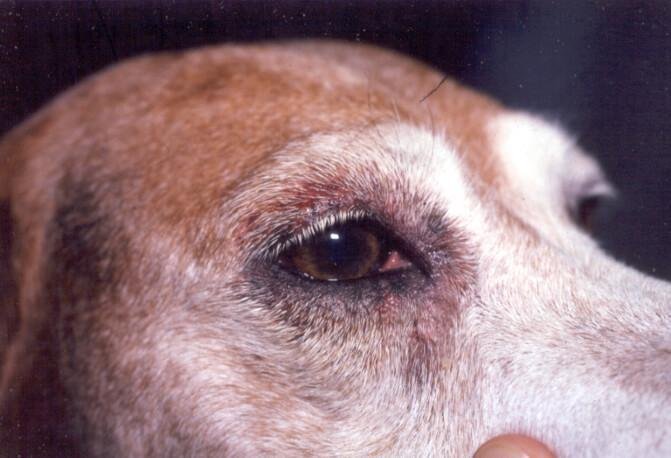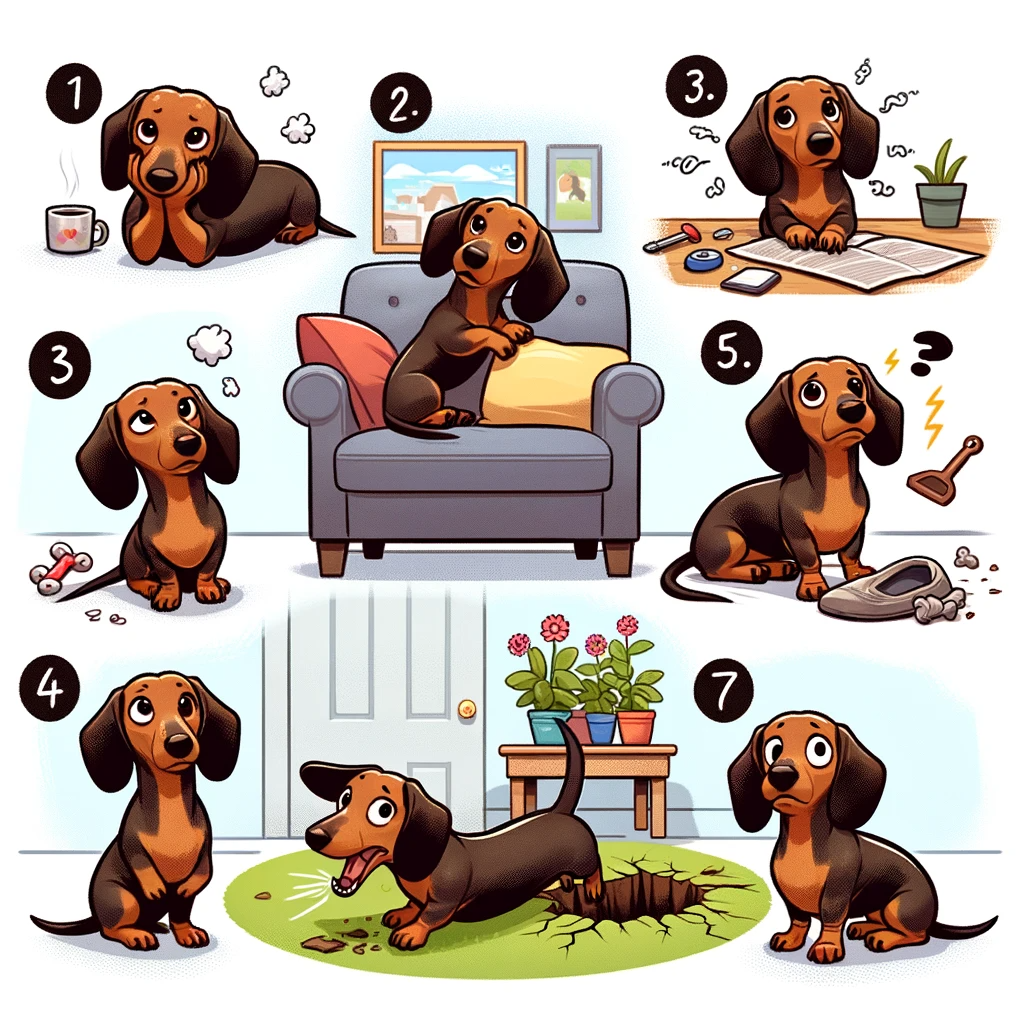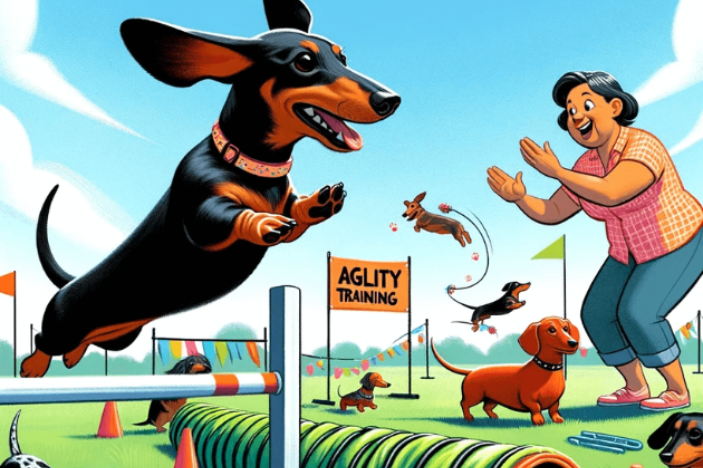Dachshund skin problem and prevention
Dachshunds are prone to several skin problems due to their unique body shape and size, which can lead to skin folds and other issues. Here are some common skin problems that dachshunds may experience and tips for preventing them.
Allergies
Dachshunds can be allergic to various things, such as food, pollen, or flea bites. If your dachshund is scratching excessively or has red, inflamed skin, it may be due to an allergy.
To prevent allergies, you can feed your dachshund a high-quality, hypoallergenic dog food and keep them away from known allergens.
Hot spots
Hot spots are areas of irritated, infected skin that are often caused by excessive licking or scratching.
To prevent hot spots, you can keep your dachshund’s coat clean and groomed and treat any flea infestations promptly.
Dry skin: Dachshunds can experience dry skin, especially during the winter months. To prevent dry skin, you can add a skin supplement to your dachshund’s diet and bathe them with a moisturizing shampoo.
Skin infections
Dachshunds are prone to skin infections, which can be caused by bacteria, yeast, or fungal overgrowth.
To prevent skin infections, you can keep your dachshund’s skin clean and dry, and treat any cuts or wounds promptly.
Acne
Dachshunds can develop acne on their chin and lips due to clogged hair follicles. To prevent acne, you can clean your dachshund’s chin and lips regularly and avoid using plastic food and water bowls.
In general, it’s essential to keep your dachshund’s skin clean and healthy by regularly grooming and bathing them, feeding them a healthy diet, and taking them to the vet for regular check-ups.
If you notice any signs of skin problems, such as itching, redness, or inflammation, it’s crucial to seek veterinary care promptly
Food sensitivities
Food sensitivities occur when a dog’s immune system reacts negatively to certain ingredients in its diet.
This can lead to a range of symptoms, including skin problems, digestive issues, and even behavioral problems. Here are some common signs that your dog may have a food sensitivity:
Skin problems: Food sensitivities can cause skin problems such as itching, redness, and rashes. Your dog may also develop hot spots or chronic ear infections.
Digestive issues: Dogs with food sensitivities may experience digestive issues such as vomiting, diarrhea, or excessive gas.
Behavioral problems: In some cases, food sensitivities can cause changes in behavior, such as hyperactivity, aggression, or anxiety.
If you suspect that your dog has food sensitivity, you can work with your veterinarian to identify the problematic ingredients and switch to a hypoallergenic dog food that doesn’t contain those ingredients.
It may take some trial and error to find the right food for your dog, but once you find a food that works, you should see a significant improvement in their symptoms.
It’s important to note that food sensitivities are different from food allergies, which are more severe and can cause anaphylaxis. If you suspect that your dog has a food allergy, you should seek veterinary care immediately
Natural sensitivity / Ecological aggravations
When it comes to natural sensitivities and ecological aggravations, there are several factors that can affect a dog’s health and well-being. Here are a few examples:
- Environmental allergies: Dogs can be allergic to environmental factors such as pollen, mold, and dust. These allergies can cause symptoms such as itching, redness, and inflammation.
- Chemical sensitivities: Dogs can also be sensitive to chemicals in their environment, such as pesticides, cleaning products, and air fresheners. These chemicals can irritate their skin, respiratory system, and digestive system.
- Climate-related sensitivities: Some dogs may be more sensitive to changes in the weather, such as extreme temperatures, humidity, or air quality.
To prevent or alleviate natural sensitivities and ecological aggravations, you can take several steps, such as:
- Keeping your dog’s environment clean and free of harmful chemicals.
- Providing your dog with a well-balanced and nutritious diet that supports its immune system.
- Use natural and non-toxic products in your home, such as cleaning products and air fresheners.
- Avoiding walking your dog during peak allergy seasons, or investing in protective gear like booties or a dog coat.
- Using air purifiers or humidifiers to improve indoor air quality and humidity levels.
- Discussing your concerns with your veterinarian, who can recommend specific treatments or medications to help alleviate your dog’s symptoms.
By taking these steps, you can help protect your dog from natural sensitivities and ecological aggravations, and provide them with a healthy and safe environment
Hereditary qualities
Dachshunds are a breed of dog that is known for their long, low-slung bodies and short legs. Like all purebred dogs, Dachshunds have specific genetic traits that are passed down from generation to generation.
Some of the most important genetic traits of Dachshunds include their coat type (which can be smooth, wirehaired, or longhaired), their color (which can be anything from black and tan to red or chocolate), and their size (which can range from miniature to standard).
Other genetic traits that can be passed down in Dachshunds include health issues, such as spinal problems and eye diseases.
It’s important for Dachshund breeders to carefully select breeding pairs and conduct health screenings to help reduce the risk of passing on these genetic health issues.
Overall, understanding the genetics of Dachshunds is important for both breeders and owners to help maintain the breed’s health and physical characteristics.
Unfortunate Nutrition
Unfortunately, malnutrition refers to a diet that lacks essential nutrients, vitamins, and minerals or is high in calories, unhealthy fats, sugars, and salt. Poor nutrition can lead to a variety of health problems, including obesity, diabetes, heart disease, high blood pressure, and nutrient deficiencies.
If your dachshund is struggling with poor nutrition, it’s a good idea to talk to a vet or nutritionist who can provide personalized guidance and support to help you make healthy food choices.
What are the Most Typical Skin Problems in Dachshunds?
Dachshunds are prone to several skin problems, including:
- Allergies: Dachshunds are prone to allergies, which can manifest as itching, scratching, and redness of the skin. Allergies can be caused by a variety of factors, including food, environmental allergens such as pollen, and flea bites.
- Atopic Dermatitis: Atopic dermatitis is a chronic skin condition that causes itching, redness, and inflammation of the skin. It is often caused by environmental allergens and can be difficult to manage.
- Skin Infections: Dachshunds are prone to bacterial and fungal skin infections, which can cause hair loss, redness, and itching.
- Alopecia: Dachshunds can develop bald patches on their skin due to a condition called alopecia. This can be caused by hormonal imbalances, autoimmune disorders, or genetics.
- Seborrhea: Seborrhea is a skin condition that causes oily, flaky skin and a bad odor. It is caused by an overproduction of sebum, which is natural oil produced by the skin.
If you notice any skin problems in your Dachshund, it is important to take them to a veterinarian for proper diagnosis and treatment.
How to Prevent Dachshund Skin Problems?
Preventing skin problems in Dachshunds can be achieved through several measures:
- Regular grooming: Regular grooming helps to keep your Dachshund’s skin and coat healthy by removing loose fur, dirt, and debris. Use a soft-bristled brush to groom your dog at least once a week.
- Proper nutrition: Feed your Dachshund a healthy, balanced diet that contains essential nutrients, such as omega-3 fatty acids and vitamin E, that promote skin health.
- Flea and tick prevention: Use a flea and tick preventative medication recommended by your veterinarian to protect your Dachshund from flea and tick bites, which can cause skin irritation and infections.
- Allergy management: If your Dachshund has allergies, work with your veterinarian to identify the allergens and develop a management plan. This may include avoiding allergens, giving your dog allergy medication, and using hypoallergenic grooming products.
- Regular vet checkups: Take your Dachshund to the veterinarian for regular checkups to catch and treat any potential skin problems early.
- Avoid over-bathing: Overbathing can strip your Dachshund’s skin of its natural oils and lead to dryness and irritation. Bathing once every three months is generally sufficient for a Dachshund unless it is particularly dirty or has a skin condition that requires more frequent bathing.
By following these tips, you can help keep your Dachshund’s skin healthy and prevent common skin problems
Omega 3 and Omega 6 unsaturated fats
Omega-3 and Omega-6 unsaturated fats are essential for the health of a Dachshund. Both of these types of fats play important roles in maintaining healthy skin, a shiny coat, and a strong immune system.
Omega-3 fatty acids are anti-inflammatory and can help reduce inflammation in the skin, joints, and other parts of the body.
They can also help promote a healthy coat and skin by reducing dryness, flakiness, and itching. Omega-3 fatty acids are commonly found in fish oil, flaxseed oil, and chia seeds.
Omega-6 fatty acids
Omega-6 fatty acids, on the other hand, are pro-inflammatory and are essential for immune system function.
They also help maintain healthy skin and promote a shiny coat. Omega-6 fatty acids are found in vegetable oils, such as corn, soybean, and safflower oil.
It is important to note that a proper balance of Omega-3 and Omega-6 fatty acids is crucial for optimal health.
While both types of fats are important, an excess of Omega-6 fatty acids can be harmful and can actually promote inflammation.
Therefore, it is recommended to feed your Dachshund a diet that provides a balanced ratio of Omega-3 to Omega-6 fatty acids.
Consult with your veterinarian to determine the appropriate amount of Omega-3 and Omega-6 fatty acids for your Dachshund based on their age, weight, and overall health
Why is diet important for healthy skin?
dachshunds need a balanced food system that is full of nutrients and minerals for a healthy body and secure framework, as well as solid skin and coat.
Research the different sources of food for your Dachshund and look for those with more than 24% protein and more than 12% fat for ideal skin and coat health.
A proper diet will help support your canine’s secure skin, which is a fundamental need when fighting any type of illness that affects the skin.
Can I use human shampoo for dogs?
Using human shampoo on dogs is not recommended, as dogs have different skin pH levels than humans.
Human shampoos can be too harsh for dogs and can strip their skin of natural oils, leading to dryness, itching, and other skin problems.
What Are the Benefits of Dachshund Skin Care?
Dachshund skin care products are designed to improve the overall health and well-being of your furry friend.
By using these products, you can ruffle, clean, and protect your dog’s skin from the sun, wind, rain, snow, and other unfavorable elements.
Final Verdict
Skin issues in Dachshunds are not typical, nonetheless, issues can emerge, mainly when your dachshund’s eating routine is deficient in the appropriate sustenance, or they are not prepared frequently.
Considering any unsettled hair or balding, it is vital to outwardly investigate your Dachshund from head to toe three times each week.
Assuming you notice balding, tingling, gnawing, or unnecessary scouring, you will need to thoroughly review your dachshund to track down the reason for the itch.
Dependably counsel your veterinarian when you suspect your Dachshund has a skin disorder or a critical condition causing their skin to be vexed.




